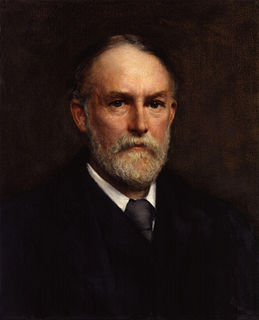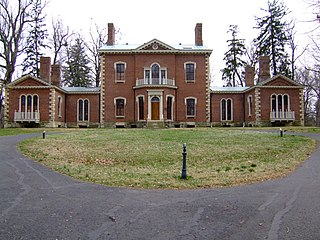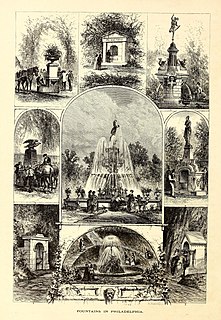Related Research Articles

The Book of Joel is collected as one of the twelve minor prophets of the Nevi'im ("Prophets") in the Hebrew Bible, and as a book in its own right in the Christian Old Testament.

The Industrial Revolution was the transition to new manufacturing processes in Great Britain, continental Europe, and the United States, in the period from about 1760 to sometime between 1820 and 1840. This transition included going from hand production methods to machines, new chemical manufacturing and iron production processes, the increasing use of steam power and water power, the development of machine tools and the rise of the mechanized factory system. Output greatly increased, and a result was an unprecedented rise in population and in the rate of population growth.

Frederic William Henry Myers was a British poet, classicist, philologist, and a founder of the Society for Psychical Research. Myers' work on psychical research and his ideas about a "subliminal self" were influential in his time, but have not been accepted by the scientific community. However, in 2007 a team of cognitive scientists at University of Virginia School of Medicine, led by Edward F. Kelly published a major empirical-theoretical work, Irreducible Mind, citing various empirical evidence that they think broadly corroborates Myer's conception of human self and its survival of bodily death.

A carriage is a private four-wheeled vehicle for people and is most commonly horse-drawn. Second-hand private carriages were common public transport, the equivalent of modern cars used as taxis. Carriage suspensions are by leather strapping and, on those made in recent centuries, steel springs. Two-wheeled carriages are informal and usually owner-driven.

The Clydesdale is a Scottish breed of draught horse. It is named for its area of origin, the Clydesdale or valley of the River Clyde, much of which is within the county of Lanarkshire.

The Cleveland Bay is a breed of horse that originated in England during the 17th century, named after its colouring and the Cleveland district of Yorkshire. It is a well-muscled horse, with legs that are strong but short in relation to the body. The horses are always bay in colour, although a few light hairs in the mane and tail are characteristic of some breed lines. It is the oldest established horse breed in England. The ancestors of the breed were developed during the Middle Ages for use as pack horses, when they gained their nickname of "Chapman Horses". These pack horses were cross-bred with Andalusian and Barb blood, and later with Arabians and Thoroughbreds, to create the Cleveland Bay of today. Over the years, the breed became lighter in frame as they were employed more as carriage and riding horses. The popularity of the Cleveland Bay has greatly fluctuated since it was first imported to the United States in the early nineteenth century. Despite serious declines in the population after the Second World War, the breed has experienced a resurgence in popularity since the 1970s, although only around 550 horses existed worldwide as of 2006.
Judith Tarr is an American fantasy and science fiction author.

Ashland is the name of the plantation of the 19th-century Kentucky statesman Henry Clay, located in Lexington, Kentucky, in the central Bluegrass region of the state. The buildings were built by enslaved African Americans, and enslaved people grew and harvested hemp, farmed livestock, and cooked and cleaned for the Clays.
Western lifestyle or cowboy culture is the lifestyle, or behaviorisms, of, and resulting from the influence of, the attitudes, ethics and history of the American Western cowboy. In the present day these influences affect this sector of the population's choice of recreation, clothing, and consumption of goods.
Urban history is a field of history that examines the historical nature of cities and towns, and the process of urbanization. The approach is often multidisciplinary, crossing boundaries into fields like social history, architectural history, urban sociology, urban geography, business history, and archaeology. Urbanization and industrialization were popular themes for 20th-century historians, often tied to an implicit model of modernization, or the transformation of rural traditional societies.

Madeline (Madge) McDowell Breckinridge was an American leader of the women's suffrage movement in Kentucky. She married Desha Breckinridge, editor of the Lexington Herald, which advocated women's rights, and she lived to see the women of Kentucky vote for the first time in the presidential election of 1920. She also initiated progressive reforms for compulsory school attendance and child labor. She founded many civic organizations, notably the Kentucky Association for the Prevention and Treatment of Tuberculosis, an affliction from which she had personally suffered. She led efforts to implement model schools for children and adults, parks and recreation facilities, and manual training programs.

John G. Stephenson, an American coachbuilder, invented and patented the first streetcar to run on rails in the United States. Stephenson also designed the New York and Harlem Railroad which was formally opened on 26 November 1832. Twelve days later a horse-drawn streetcar built at Stephenson's works and named John Mason after the president of the railroad company, started the public service. Stephenson is therefore remembered as the creator of the tramway. Stephenson was the great-grandfather of Alan Stephenson Boyd, the first United States Secretary of Transportation.
Orthopathy or natural hygiene (NH) is a set of alternative medical beliefs and practices originating from the Nature Cure movement. Proponents claim that fasting, dieting, and other lifestyle measures are all that is necessary to prevent and treat disease.

The Turin Horse is a 2011 Hungarian philosophical drama film directed by Béla Tarr and Ágnes Hranitzky, starring János Derzsi, Erika Bók and Mihály Kormos. It was co-written by Tarr and his frequent collaborator László Krasznahorkai. It recalls the whipping of a horse in the Italian city of Turin that is rumoured to have caused the mental breakdown of philosopher Friedrich Nietzsche. The film is in black-and-white, shot in only 30 long takes by Tarr's regular cameraman Fred Kelemen, and depicts the repetitive daily lives of the horse-owner and his daughter.
This is a history and list of drinking fountains in the United States. A drinking fountain, also called a water fountain or bubbler, is a fountain designed to provide drinking water. It consists of a basin with either continuously running water or a tap. The drinker bends down to the stream of water and swallows water directly from the stream. Drinking water fountains are most commonly found in heavy usage areas like public amenities, schools, airports, and museums.
Christine McHorse, also known as Christine Nofchissey McHorse, was a Navajo ceramic artist from Santa Fe, New Mexico.

Mary Jane Warfield Clay was an American socialite, suffragist, abolitionist, and political activist. An early leader in the suffrage movement in Kentucky, she began by forming a suffrage club at her home in 1879. Her experience and success as a farm manager included her acute business sense in the middle of the American Civil War, like selling supplies from her farm to both Union and Confederate forces when they each occupied the Commonwealth. Her most active work in the suffrage movement was to encourage and support her daughters who would become the most well known Kentucky suffragists of the nineteenth and early twentieth centuries.

Public drinking fountains in Philadelphia, Pennsylvania, United States, have been built and used since the 19th century. Various reform-minded organizations in the city supported public drinking fountains as street furniture for different but overlapping reasons. One was the general promotion of public health, in an era of poor water and typhoid fever. Leaders of the temperance movement such as the Woman's Christian Temperance Union saw free, clean water as a crucial alternative to beer. Emerging animal welfare organizations, notably the Society for the Prevention of Cruelty to Animals, wanted to provide water to the dogs and working horses of the city on humanitarian grounds, which is why Philadelphia's drinking fountains of the era often include curb-level troughs that animals could reach.
Clay McShane was an American historian.
References
- ↑ "Joel A. Tarr". cmu.edu. Retrieved May 1, 2017.
- ↑ Louderback, Art (2007). "Book Review: The Horse in the City: Living Machines in the Nineteenth Century by Clay McShane and Joel A. Tarr". Western Pennsylvania History (Fall): 63. Retrieved June 9, 2022.